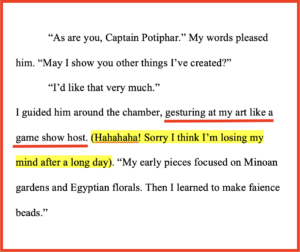 When I saw the “Evel Pie” sign on our recent “first timer’s” tour of Las Vegas, I thought: Those folks needed a better editor!
When I saw the “Evel Pie” sign on our recent “first timer’s” tour of Las Vegas, I thought: Those folks needed a better editor!
Then I discovered the place was named after the motorcycle stunt driver, Evel Knievel. Very clever–and very good pizza (though in our taste comparison, Good Pie was better, IMO). 😉
Have you ever seen a road sign or a poorly written message in the window of a small business? How many times have you put a book down because of the typos or inconsistencies?
A great editor is so very important–whether formally titled or that informal person who catches all our little “whoopsies” before they’re seen publicly.
But honestly . . . GREAT editors are hard to find.
Three Signs of a Great Editor
I couldn’t have articulated the difference between a great editor and a not-so-great one until my work-in-progress (WIP), Potiphar’s Wife. Unfortunately, after completely rewriting this manuscript four times, I now have a much clearer understanding of how a fantastic editor approaches necessary improvements because–for the first time in my writing career–I experienced some really poor editing.
This post will not focus on the negative circumstances. As a brief explanation, let me simply say that the process could have been much smoother without the input of one particular editor. I have a phenomenal managing editor and line editor, so let’s take a look at what makes them so great!
1st Sign of a Great Editor
Editors and authors don’t necessarily have to be friends, but the editing relationship requires a certain level of chemistry and trust similar to friendship. If the chemistry is right, an editor and author can be quite “bare knuckled” in their exchanges about a manuscript’s shortfalls and strengths. If, however, the chemistry is missing, any comment–no matter how seemingly innocent to the party saying it–can be misconstrued and hurtful.
A great editor not only reads a manuscript. A great editor reads the author who wrote it and seeks to build rapport that will pave the way for a partnership. As Christian authors and editors, we’re working toward the same goal Paul described to the Corinthian church:
“I have become all things to all people so that by all possible means I might save some. I do all this for the sake of the gospel, that I may share in its blessings.” 1 Corinthians 9:22–23
Good Chemistry Example
My recent line edit on Potiphar’s Wife was the fourth rewrite I’d done on that manuscript. This editor and I have done five books together, so we have built great chemistry. Because we knew each other so well, she could tell I was extremely weary and added a little humor late one night when she began feeling overwhelmed too…
BTW, there weren’t many game show hosts in ancient Egypt.
 I literally LOL when I read her edit and knew it was time for us both to stop editing for the night!
I literally LOL when I read her edit and knew it was time for us both to stop editing for the night!
2nd Sign of a Great Editor
A great editor doesn’t try to find things I’ve done WRONG. He or she partners with me to make the manuscript stronger.
HUGE difference!
An author becomes the expert on our content. Only we know exactly the story we want to tell. We do the research. We know the characters. We’ve spent hours, days, weeks, perhaps months or years preparing and writing our first draft.
A great editor can make that story come alive on the page by:
- Alerting you to areas that are unclear: If your editor stumbles at a choppy, awkward, or confusing section, so will your readers. It doesn’t matter that you can explain it to your editor because you won’t be able to explain it to every reader!
- Clarifying your research: This one is tricky. There’s a difference between challenging your research and clarifying it. In the first draft of Potiphar’s Wife, I labeled the nation directly west of Egypt’s Delta as Libya. My managing editor askedthe simple question, “What was Libya called during this era?” Hmmm. On all the resources I’d checked, it was called Libya, but because of her question, I dug deeper and discovered during Joseph’s time it was the Land of Temehu! That’s great editing!
- Differentiating poorly written from poorly communicated: There were two scenes in Potiphar’s Wife that all three editors stumbled over. The difference in how they handled those scenes was striking. Only my line editor–who I’ve worked with for five years–asked me, “Why is this scene important to the story as a whole?” Both scenes in question were significant to the historical integrity of the book. I still had to rewrite them, but my line editor helped me maintain the book’s historicity while communicating the action and characters’ dialogue in a far more believable way for today’s readers.
3rd Sign of a Great Editor
I don’t want to lead y’all to believe that there’s one perfect editor, and once you find him/her, you’re matched for life. Editors can change in the blink of an eye. I’ve been so fortunate to have worked with UH-MAZING editors since my first contract in 2008. The best ones have one thing in common:
They don’t take themselves–or me–too seriously.
Laughing Thru the Pain
When I received the first edit on my debut novel, it was miraculously clean. Not so on the second novel’s first edit in 2010. Love’s Sacred Song needed a total rewrite after the substantive edit (the first edit).
She (kindly) pointed out that I’d written King Solomon more like Hollywood playboy, Charlie Sheen–who at the time was every tabloid’s target–rather than God’s beloved chosen king.
“Then David comforted his wife Bathsheba . . . She gave birth to a son, and they named him Solomon. The Lord loved him; and because the Lord loved him, he sent word through Nathan the prophet to name him Jedidiah.” 2 Samuel 12:24–25 (emphasis added)
So throughout the manuscript, every time I made an overly-harsh reference to Solomon, my editor wrote “Charlie Sheen” in the margin.
Though I was shaken to the core at a total rewrite, her sense of humor and humble teaching methods changed a very painful process into a irreplaceable time of growth.
Why It Matters To You . . .
I realize many people reading this post aren’t authors or editors, but Jesus can still use it to speak to your heart.
On three separate occasions, my editors told me the first draft was so bad, they weren’t sure if ANY rewrite could make it publishable. (Thankfully, they waited until AFTER the book was published to say it!)
Maybe you’re facing a project or circumstance that seems utterly impossible. Hopeless even.
One of my very bad first drafts was Isaiah’s Daughter–my only Christy Award Winner! More people email me about that book and the blessings of its message than any other. Not because I’m a great writer, but because with God all things are possible!
What waits at the finish line if you, too, persevere through the hard stuff to reach the prize?
Today’s Question:
- Is there something in your life that feels impossible that the Lord, through this post, has encouraged you to finish?
- Which of the three signs of a great editor seems most important to you?
Tweet-ables:
- Discover 3 Signs of a Great Editor and find a kindred spirit to make your words come alive on the page. #Revell #WaterbrookMultnomah #biblicalfiction
- Not an author or editor? Jesus can still use 3 Ways to Work With An Editor to encourage you today. #Revell #WaterbrookMultnomah #biblicalfiction
- One of my so-called unpublishable first drafts was #IsaiahsDaughter, my only #ChristyAward winner! With God all things are possible! Read today about great editors. #Revell #WaterbrookMultnomah #biblicalfiction



Comments 4
Oh this couldn’t have come at a more perfect time!!! On a day when I just a found my glasses which had been LOST for 3weeks…this comes. The emotions that come with LOOSING something..that is vital to your very being….(you can finish that). We live…we breathe..we do what we do…and then there’s JESUS Who watches over us, knows every emotion and chance we go thru…SO. WE thank and LOVE HIM!
Author
I’m so glad you found your glasses, Mama! But I’m even happier that you were able to move forward after losing them with a sweet and joyful attitude that left the whole matter in the Lord’s capable hands. You are an inspiration to me (and so many others) because–after all–no one gets to practice at being 91 years old! It’s a first try, and you’re doing a great job at being a gracious and humble example to your children, grandchildren, and even those great-grands who are now watching (and asking you to officiate their weddings!). ❤️ You are a remarkable woman, and I love you so.
I’m revamping my manuscript; from third-person past tense to first-person present tense … not suggested by an agent or editor but by a published author friend. But it has been good for me, as I’m finding many things that needed changing besides the POV and tense. I believe the change has helped me feel “my voice” which was a complete mystery to me before.
Thanks, Mesu, for sharing.
Author
Finding your “voice” is sooooo crucial, Velma! It was YEARS before I understood what that even meant! So excited for you and the process you’re going through. Keep up the good work, gal! 😘